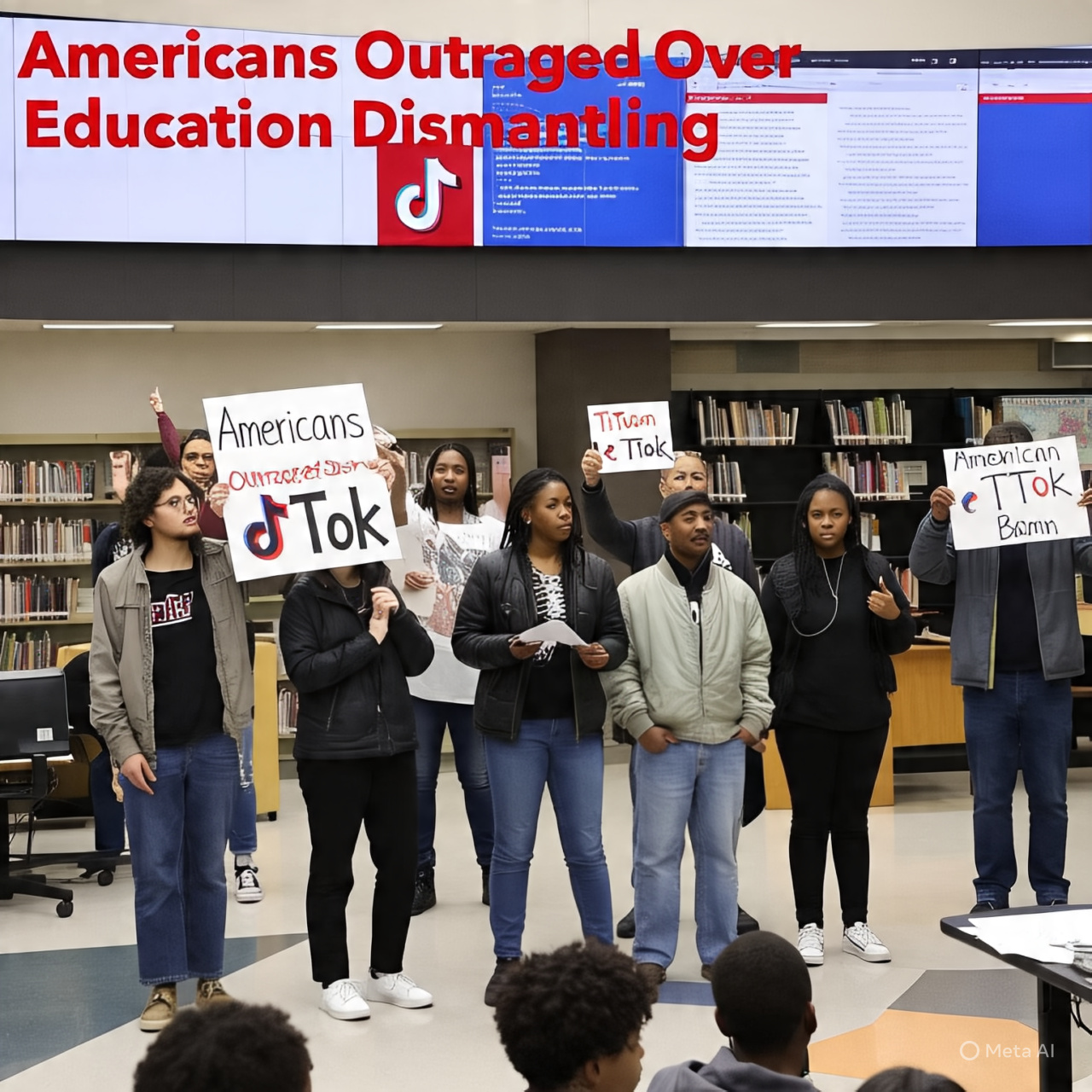FnF News
TikTok Ban Sparks More Public Outrage Than Calls to Dismantle Department of Education, Highlighting America’s Skewed Priorities
FNF News | May 22, 2025
As the United States faces major policy shifts ranging from foreign aid cuts to education reforms, a new cultural flashpoint has revealed a stark disconnect in public engagement: Americans are more emotionally stirred by the potential ban of TikTok than they are by the near-dismantling of the U.S. Department of Education.
This observation, voiced across political circles and social media platforms, is being held up as a reflection of the nation’s current values—and a worrying indicator of where public attention is most easily captured.
TikTok Ban: A Digital Generation’s Outcry
When Congress passed legislation earlier this year giving TikTok’s Chinese parent company, ByteDance, 180 days to divest or face a full U.S. ban, the backlash was swift and fierce. Millions of users flooded social media platforms to protest the move, accusing lawmakers of censorship, generational targeting, and stifling creative expression.
According to a Pew Research Center survey conducted in April, 67% of Gen Z respondents opposed the ban, with many citing TikTok as their primary news source and outlet for self-expression.
“This app is more than dancing—it’s our voice,” said 22-year-old New York-based content creator Mia Rodriguez. “Taking it away feels like a personal attack.”
Meanwhile, Education Department Faces Quiet Sunset
In stark contrast, a recent Republican-led proposal to phase out the U.S. Department of Education—a move that would drastically reshape federal oversight of public schools—has generated relatively little public pushback, despite its far-reaching implications.
The proposal, introduced by Rep. Thomas Massie (R-KY), would eliminate the department entirely by 2026 and return all education control to the states. Though education experts and advocacy groups have voiced concern, the general public response has been muted.
“It’s stunning,” said political analyst Jessica Maloney. “We’re talking about a federal agency that affects 50 million students and $80 billion in spending annually—and it’s being discussed with less urgency than a social media app.”
Cultural Commentary: What This Says About America
Many commentators argue that the disproportionate response reflects deeper societal trends—namely, the rising influence of digital culture over civic engagement.
“We’ve reached a point where entertainment and digital identity are prioritized over long-term institutional decisions,” said historian Dr. Samuel Turner from the University of Virginia. “It’s not that education isn’t important—it’s that TikTok is simply louder.”
On X (formerly Twitter), political commentator Ben Shapiro echoed the sentiment:
“More Americans are emotionally invested in TikTok’s fate than in the future of American education. That should tell you everything you need to know.”
Lawmakers Weigh In
While Democrats criticize the Department of Education bill as an attack on public schools and equal opportunity, Republicans defend the move as a step toward local control and parental empowerment.
“Washington has no business telling Texas what should be in our textbooks,” said Rep. Lauren Boebert (R-CO). “We need schools that serve families—not bureaucrats.”
Meanwhile, the TikTok ban remains stalled in legal limbo, as ByteDance files suit against the U.S. government, arguing the ban violates free speech protections.
A Generational Divide
Observers note a stark generational divide in both issues:
- Older Americans largely support dismantling the Department of Education in favor of state control.
- Younger Americans are more concerned about losing access to TikTok, which they see as essential for culture, community, and activism.
“We’ve become a nation that can be stirred to protest by algorithms but sleeps through decisions about our schools,” said sociologist Dr. Alicia Greene. “That’s the digital paradox.”
Conclusion
The contrast between outrage over TikTok and silence over education reform is a stark reminder of shifting national priorities. As social media becomes the battleground for identity and influence, the quiet dismantling of key institutions may be occurring without the full attention—or consent—of the people most affected.
Sources:
- Pew Research Center: “Public Opinion on TikTok Ban” – April 2025
- Congressional Record: House Proposal to Eliminate Department of Education – March 2025
- NPR, “TikTok Ban and Political Fallout” – May 2025
- Washington Post, “Department of Education Reforms: Public Response” – May 2025

